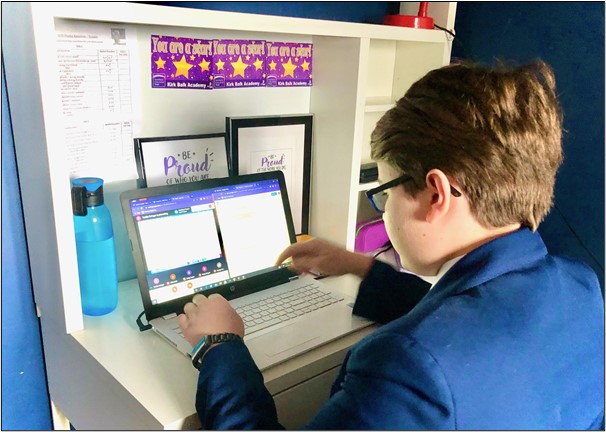
Dean Buckley is Principal of Kirk Balk Academy in Hoyland, part of the Northern Education Trust. Dean writes about how his school has worked to match their curriculum to their online platform and made sure to support their pupils’ wellbeing while they learn from home.
As the initial practical challenges of remote education have been largely overcome, our trust faced a more complicated challenge: how can we ensure that we continue to deliver outstanding online lessons for all learners, ideally streamed live, within a coherent curriculum? And, just as importantly, how can we make sure we’re supporting our students’ mental health and wellbeing while they’re learning from home?
Collaboration
For us, collaborative learning strategies are fundamental to how our students learn. A strong praise culture underpins our curriculum and is an essential aspect of all lessons – it’s human nature to respond well when someone tells you that you’ve done a good job, so we make sure our students get that reinforcement. Knowledge retrieval is embedded throughout the curriculum, so we worked collaboratively across the trust to identify and promote best practice for maintaining these core principles while delivering lessons.
Consistency
To guarantee consistency of provision, we devoted much of our staff training to the teaching and learning aspects of streaming lessons, to ensure we’re making the most of what our online platform has to offer.
We can now provide up to 5 hours of live lessons every day. Students complete classwork in online workbooks, which are bespoke for each lesson and can be adapted for individual students. Preparing these workbooks with tasks, prompts, and success criteria limits the amount of teacher instruction during lesson, freeing them up to respond to individual student queries. We’ve also shifted our feedback online, with live marking where students can engage directly, meaning staff can provide more personalised and instant feedback than in a traditional on-site lesson.
Creativity
Staff have embraced their creativity to make remote lessons both collaborative and interactive. They use the chat function as a discussion forum and a means for sharing model answers and praise for students and their visualisers to model answers and share student work for peer assessment and collaborative learning. Another key feature of the interactivity of our lessons is the ease with which staff can support each other and enhance student learning: Teaching Assistants are assigned to classes and attend remotely to support identified students and senior leaders can attend lessons to provide encouragement and support to staff and pupils.
Offline, our incredible support and pastoral staff make around a thousand phone calls per week, trying to make sure we’re there for our families when they need us. In addition to these calls, students (and parents) can use Google Forms to request a wellbeing call if they need to speak to us about anything at all, from school-work to how they’re feeling. This forms part of our wider initiative to support the wellbeing of the whole school community.
Celebrating success
We are passionate about celebrating the success of our incredible students; praise is at the heart of all we do. Normally, the sound of applause dominates the corridors of our academies and the highlight of our students’ weeks are the student-led PROUD events where they share their work with senior leaders and are praised for their achievements. We will not allow school closures to mean that students lose such a positive aspect of academy life, so we launched PROUD Thursday Online. Students email their work in and receive positive, congratulatory comments and a certificate. With their permission, their work is then shared and celebrated publicly on Twitter and in remote assemblies.
Alongside the PROUD events, we have launched a remote Cause for Applause on the Doors. Parents and teachers create praise messages for students which we then share publicly. Some families even pin these on doors around the house, just like we would ordinarily do on classroom doors when our schools are open!
Our Random Acts of Kindness programme is now also fully established in remote working, with students (and staff) encouraged to share their experiences of kindness that week on Wellbeing Wednesday. Research shows that being kind to others can be beneficial to our own mental health. It can also reduce stress, improve our emotional wellbeing and even benefit our physical health.
It has been wonderful to hear about the resilience, kindness, talent and determination of our incredible students. It means so much to both our students and staff to continue our strong culture of praise unabated.
We are proud of how our students and staff have approached the ‘new normal’ with positivity and an open mind, which has enabled them to not just adapt and survive, but adapt and thrive.
The Department’s guidance on remote education sets an expectation for 3-5 hours of work per day, dependent on Key Stage, and does not specify that this must be “live”. Schools can get help with their remote education offer, including funding, technology support and helpful resources on GOV.UK.